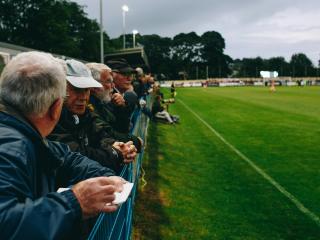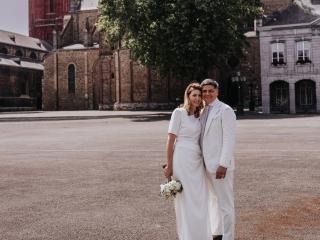Rowing is the story of alumna Marieke Hagemans’ life
During her time as a student, alumna Marieke Hagemans was an avid rower at Tilburg student rowing association Vidar. After graduation from her Master’s program of Organizational Management, she left for England in 2013 to work as an innovation consultant. There, she took up rowing again. At one point, Marieke was training twelve times a week besides her full-time job. Although she does not row anymore, the sport is still very much part of her life because of her work at British Rowing as the Director of Membership & Rowing Community.
Marieke: “When I think back to my student days, I think first and foremost of my friends, whom I mainly got to know through Vidar, and the enjoyable time spent at numerous parties. My housemates were a mix of Olof, Plato, and Vidar members. During TIK Week [what is now TOP Week], they were all busy lobbying to get me to join their various associations. Ultimately I chose Vidar. I had started a teacher training program at a university of applied sciences but soon discovered it was not for me. I wanted to stay in Tilburg, so I looked for a suitable degree program in the city. That was Human Resource Management. In high school, I was scraping through with grades that were only just sufficient. I had opted for senior general secondary education (HAVO) rather than pre-university education (VWO), because I thought swimming was more interesting than school. Even in the teacher training program, I was cutting corners. That changed when I started my internship at Philips, which turned out to be much more strategic than expected.”
“In the sorority I was a member of, I was the only university of applied sciences student. Towards graduation I thought: ‘If my friends can do a program at a research university, why shouldn’t I be able to?’ I was not yet ready to enter the labor market anyway. At Tilburg University, I was challenged for the first time. It has meant a lot for my personal development.”
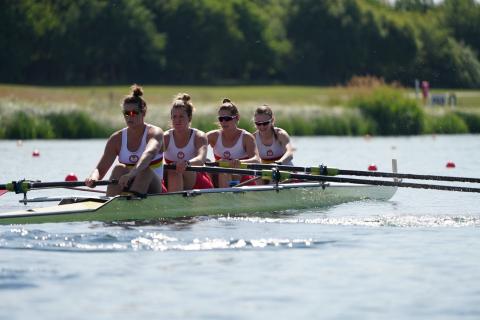
In the end, I trained twelve times a week besides my full-time job. On working days, I trained in the morning before work and in the evening after work and, on weekends, I trained twice in the morning
Working and rowing
“During my studies, I did an internship at Philips in Eindhoven and later in Shanghai. At the end of my time there, I asked one of the supervisors if he had any career advice for me. At the time, I did not really have a clear idea of what I wanted to do after graduation, except that I didn't want to stay in the Netherlands after my time in Shanghai and a semester in Sydney. He drew my attention to an innovation consultancy agency in England. I knew I did not necessarily want to stay in the Netherlands, so I wrote an open application to the company., It was successful, so I moved to Newcastle. When the company went bust soon after, my parents ardently hoped that I would return to the Netherlands. But I applied again in England and found a job in London as an innovation consultant. And together with a friend from Tilburg who also lived in London at the time, I started rowing again. Soon I was totally in the flow again. In the end, I trained twelve times a week besides my full-time job. On working days, I trained in the morning before work and in the evening after work and, on weekends, I trained twice in the morning.”
“I found a different job after two years, because it became too difficult to combine rowing with my job as a consultant. The work culture there involved long working hours. If I left the office at six to be able to do some training at seven, my colleagues made jokes about me compensating for coming in late. After training, I often worked till twelve at night, and I had to get up at six in the morning for the next training session. During an evaluation at work, I was told I was not committed enough, even though I worked really efficiently. That was the moment I applied to British Rowing, the national governing body for the sport of rowing.”
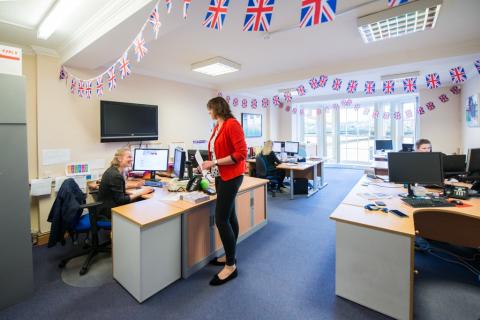
Yet, even after eleven years in England, I watch the Games with mixed feelings. Sometimes I just want the Dutch team to win.
Image change
“British Rowing is a membership organization: in England, you have to be a member of our organization to be able to compete. The government gives us grants for member participation. In England, rowing has the reputation of being a sport for rich, white, and posh people. We are busy changing this image, for instance, by introducing children to rowing through school programs at a young age. We hope that, by experiencing the sport first-hand, they will discover how much fun it is. We have also initiated diversity program focused on adapted rowing, new types of competitions, and indoor rowing to try to make the sport appealing to a wider audience. This also requires a change within the clubs themselves.”
Rowing to Paris
“At the moment, the national rowing team is training hard for the Olympic Games in Paris. The Olympic Games are always a great opportunity for us to introduce more people to rowing. It is unlike football, which is ubiquitous, with reports of matches all over the newspapers every week. During the Olympic Games in London in 2012, membership of British Rowing peaked. The Games that followed, in Rio de Janeiro and Tokyo, were less successful, also because of the different time zones and the distance. Paris is like a home game: the time difference is only one hour and it is easy for people to travel there if they want. We are now busy generating interest in rowing before, during, and after the Olympic Games in collaboration with the British Olympic Association (BOA), who are setting up fan zones across the country so people can watch sports live together. We do so, among other things, with a program called ‘Learn to Row’. We hope it will stimulate rowing clubs to open their doors and recruit new members.”
My husband, whom I met at Vidar, is a rowing coach so, besides work, there is enough rowing going on in my life
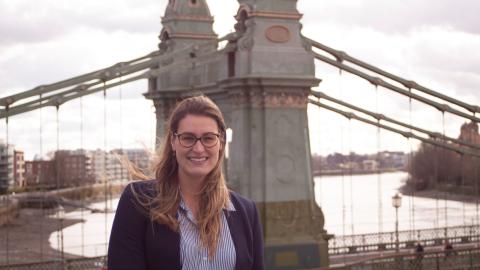
“Working during the Olympic Games is very special. We often watch the matches with the entire team. We have huge sympathy for the athletes because we are one organization. Yet, even after eleven years in England, I watch the Games with mixed feelings. Sometimes I just want the Dutch team to win. I always hope that they are not in a final together. Hearing the Dutch national anthem being played for the winner is still a different experience from hearing “God Save the King”.”
Rowing as work and as a leisure activity
Marieke is taking a backseat with her own rowing at the moment: “I do not row at all now. I had my daughter eighteen months ago, so my priorities are organized differently at the moment. My husband, whom I met at Vidar, is a rowing coach so, besides work, there is enough rowing going on in my life.”
Date of publication: 24 April 2024

